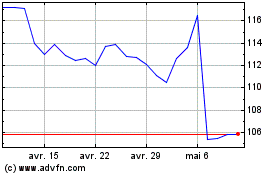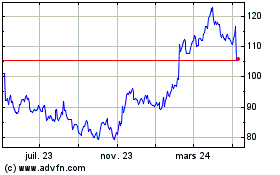By Joe Flint
This article is being republished as part of our daily
reproduction of WSJ.com articles that also appeared in the U.S.
print edition of The Wall Street Journal (May 15, 2019).
Walt Disney Co. moved to take full control over Hulu through a
wide-ranging deal with Comcast Corp., ending years of complicated
ownership of one of the media industry's hot properties.
A streaming-service pioneer, Hulu had four parents when it was
launched in 2008, primarily as a hedge against internet piracy of
TV shows.
It has since emerged from an afterthought in the streaming wars
to a legitimate competitor to Netflix Inc. by expanding into live
television and betting on original shows such as "The Handmaid's
Tale," a critical and commercial success.
Under Tuesday's agreement, Comcast -- Hulu's last remaining
minority stakeholder -- can require Disney to purchase the
one-third stake its NBCUniversal subsidiary owns in Hulu as early
as 2024, the companies said.
Disney can also require NBCUniversal to sell that stake to
Disney for at least $9 billion, under a guarantee that Hulu's
equity value at the time of a deal be at least $27.5 billion. Just
last month, the streaming service was valued at $15 billion, when
another minority shareholder, AT&T Inc., agreed to sell its
stake back to Hulu.
Disney, which is launching its own direct-to-consumer streaming
service called Disney+, has ambitious plans for Hulu. The company
has said its own streaming service would focus on content for
families and children, while Hulu is expected to be an outlet for
shows aimed at adults. After buying most of the entertainment
assets of 21st Century Fox, Disney now owns the Twentieth Century
Fox library, as well as the FX cable channel, the latter of which
is known for edgier fare. At an investor conference Tuesday, Disney
Chief Executive Robert Iger said he could see FX making original
content for Hulu.
Having a clear mission is a major change for Hulu, which has had
multiple owners -- including Comcast, 21st Century Fox, Disney and
Time Warner Inc. -- since its inception as a joint venture. That
often led to conflicts over strategy as each company had different
priorities, and the lack of direction led Hulu to be known in the
industry as "Clown Co."
Hulu's original goal was to be a platform for broadcast
television shows in the hopes that people would stop going to
Google's YouTube or other portals to watch pirated content.
The streaming service managed to grow its subscriber base from 6
million in 2014 to more than 25 million last year by moving
aggressively into both original content and offering a pay-TV
distributor service called Hulu Plus, which is a low-budget
alternative to traditional cable and satellite television.
Hulu's owners have pumped billions of dollars into the company,
which is unprofitable. At an investor conference last month, Disney
said Hulu's operating losses would hit $1.5 billion in fiscal 2019
and a slightly smaller loss in 2020. The company said Hulu's
domestic operations would become profitable in either fiscal 2023
or 2024.
As part of their deal, Disney and Comcast agreed that future
"capital calls" will be funded through a combination of equity and
debt. If Comcast doesn't participate, its stake would be reduced,
though never below 21%.
Comcast on Tuesday said it would give up its three seats on the
Hulu board. For Disney, the arrangement helps clear a path for the
entertainment giant to manage Hulu without having a competitor at
the table to weigh in on strategy. Although Disney already
controlled the Hulu board, the bylaws of the company gave some veto
power to Comcast.
For Comcast, the deal allows it to capitalize financially if
Hulu is successful over the next few years, even as the cable giant
pursues its own path in streaming video. NBCUniversal is launching
a direct-to-consumer service next year that will be free to cable
TV subscribers and available for a subscription fee to
cord-cutters.
Part of Hulu's value for consumers is its ability to show
programming from major networks including ABC, Fox and NBC during
the TV season. As part of the Disney pact, Comcast's current deal
to provide NBCUniversal content can end in three years -- and in
one year, NBCUniversal will be able to put some of that content on
its as-yet unnamed streaming service.
NBCUniversal Chief Executive Steve Burke said the deal is "a
perfect outcome for us," adding that the "extension of the
content-licensing agreement will generate significant cash flow for
us, while giving us maximum flexibility to program and distribute
to our own direct-to-consumer platform."
As part of the arrangement, Disney and Comcast said they would
fund Hulu's recent purchase of AT&T's stake in the streaming
platform. That deal increased Disney's interest in Hulu to 66% and
NBCUniversal's to 33%.
In the past few years, Hulu has become known for its original
programming, as well as for being a place to catch up on shows from
other outlets. The service is launching "Catch-22," a new ambitious
limited series based on the Joseph Heller novel and starring George
Clooney.
Hulu in February cut the price for its least expensive
subscription plan and raised the cost of its live TV offering, in
an effort to bolster its subscriber numbers while increasing the
profit margins on its most expensive plan.
Micah Maidenberg contributed to this article.
Write to Joe Flint at joe.flint@wsj.com
(END) Dow Jones Newswires
May 15, 2019 02:47 ET (06:47 GMT)
Copyright (c) 2019 Dow Jones & Company, Inc.
Walt Disney (NYSE:DIS)
Graphique Historique de l'Action
De Mar 2024 à Avr 2024

Walt Disney (NYSE:DIS)
Graphique Historique de l'Action
De Avr 2023 à Avr 2024
